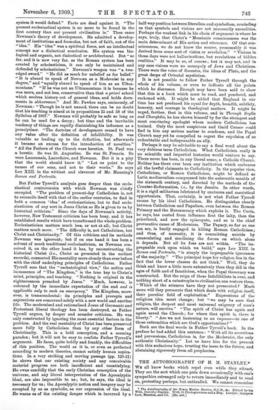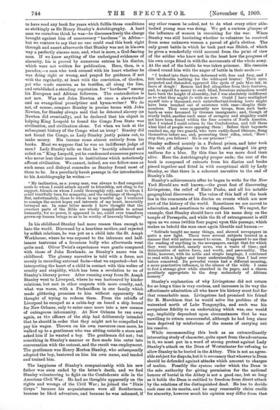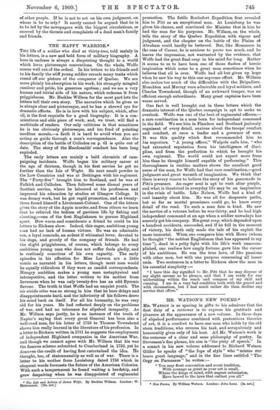THE AUTOBIOGRAPHY OF H. 11.. STANLEY.* Wm all know books
which repel even while they attract. They are the sort which one puts down occasionally With one's sympathies estranged only to return immediately and to read on, protesting perhaps; but enthralled. We cannot remember
* The Autobiography of Sir Henry Morton Stanley, S.C./3., h.. Edited bridal Wife, Dorothy Stanley. With 16 Photogravures and. a Mop. London : kaippgos
• Low, Marston, and Co. Pls. net.]
to have read any book for years which fulfils these conditions so strikingly as Sir Henry Stanley's Autobiography. A bard man we ourselves think he was—he discusses freely the charge brought against him of unnecessary " hardness " in Africa— but we venture to say that no one could read this book right through and assert afterwards that Stanley was not in his own way a perfectly sincere man, and, what is more, a God-fearing man. If we know anything of the undesigned evidences of sincerity, his is proved by numerous entries in his diaries, which were not written for publication. Here, then, is a paradox, —a man who took counsel with his heart whether he was doing right or wrong, and prayed for guidance. if not with the regularity, at least with the conviction, of Gordon, yet who made enemies, as he testifies, all along the line, and established a standing reputation for "hardness" among his European and African followers. The contradiction is not new. Was not John Newton at once a slave-trader and an evangelical proselytiser and hymn-writer? We do not, of course, compare Stanley in precise terms with John Newton, for Stanley always said that he detested slavery (as Newton did eventually), and he declared that his object in helping King Leopold to found the Congo Free State was civilisation, and civilisation alone. Yet when we look at the subsequent history of the Congo what an irony! Stanley did not found the Congo, as Lady Stanley justly points out, to make money. His income came almost entirely from his books. Must we suppose that he was an indifferent judge of men ? Lady Stanley tells us that he "heartily admired and relied on" King Leopold, yet he condemned numerous persons who never lent their names to institutions which notoriously affront civilisation. We cannot, indeed, see our fellow-men as such mean and disloyal comrades as Stanley found most of them to be. In a peculiarly harsh passage in the introduction to his Autobiography he writes :—
" My inclination, as a young man, was always to find congenial souls to whom I could attach myself in friendship, not cling to for support, friends on whom I could thoroughly rely, and to whom I could trustfully turn for sympathy, and the exchange of thoughts. But, unfortunately, those to whom in my trustful age I ventured to consign the secret hopes and interests of my heart, invariably betrayed me. In some bitter moods I have thought that the sweetest parts of the Bible are wholly inapplicable to actual humanity, for no power, it appeared to me, could ever transform grown-up human beings so as to be worthy of heavenly blessings."
In his childhood Stanley had more reason than enough to hate the world. Disowned by a heartless mother, and rejected by selfish relations, he was put as a child into the St. Asaph Workhouse, where he was exposed to the inhuman and half- insane tantrums of a ferocious bully who afterwards went quite mad. Oliver Twist's experiences were gentle compared with those of John Rowlands. as Stanley's name was in childhood. The gloomy narrative is told with a force, not merely in recording external facts—that we expected—but in interpreting the heart of a child in contact with this welter of cruelty and stupidity, which has been a revelation to us of Stanley's literary power. After running away from St. Asaph Stanley went to Liverpool, where he was harboured by kinder relations, but met in other respects with more cruelty, and, what was worse, with a Pecksniffism in one family which made glittering promises to him , without apparently the thought of , trying to redeem them. From the rebirffs of Liverpool he escaped as a cabin-boy on board a ship bound for New Orleans, only to enter once more into a new cosmos of outrageous inhumanity. At New Orleans he ran away again, as the officers of the ship had deliberately intended that he should in order that they might not be compelled to pay his wages. Thrown on his own resources once more, he walked up to a gentleman who was sitting outside a store and
asked him if he wanted a boy. The gentleman did not ; but something in Stanley's manner or face made him enter into conversation with the outcast, and the result was employment. The gentleman was Henry Morton Stanley, who subsequently adopted the boy, bestowed on him his own name, and tended and trained him.
The happiness of Stanley's companionship with his new father was Soon ended by the latter's death, and we find Stanley volunteering to fight on the Confederate side in the American Civil War. He had no thoughts apparently on the rights and wrongs of the Civil War ; he joined the "Dixie Greys" because his acquaintances were all Southerners, because he liked adventure, and because he was ashamed, if any other reason be asked, not to do what every other able- bodied young man was doing. We get a curious glimpse of the influence of women in recruiting for the war. When. Stanley was still hesitating whether to volunteer he receiveil
from some unknown woman a parcel of girl's clothes. The only great battle in which he took part was Shiloh, of which
he gives a wonderfully vivid account from the point of view of the soldier who knew not in the least how the progress of his own corps fitted in with the movements of the whole army. At the end of the battle he was taken prisoner. His enemies closed round him with the anger of battle in their souls :—
"I looked into their faces, deformed with fear and fury, and I felt intolerable loathing for the wild-eyed brutes ! Their, eyes, projected and distended, appeared like spots of pale blue ink, in faces of dough ! Reason had fled altogether from their features, and, to appeal for mercy to such blind, ferocious animalism would have been the height of absurdity, but I was absolutely indifferent as to what they might do with me now. Could I have multiplied myself into a thousand, such unintellectual-looking louts might have been brushed out of existence with ease—despite their numbers. They were apparently new troops, from such back- lands as were favoured by German immigrants : and, though of sturdy build, another such mass of savagery and stupidity could not have been found within the four corners of North America. How I wished I could return to the Confederates, and tell them what kind of people were opposing them ! Before their bayonets reached me' my two guards, who were ruddy-faced Ohioans, flung themselves before me, and, presenting their rifles, cried, Here L. stop that, you fellows ! He is our prisoner "
Stanley suffered acutely in a Federal prison, and later took the oath of allegiance to the North and changed his grey uniform for a blue. By this time he was more dead than
alive. Here the Autobiography proper ends ; the rest of the book is composed of extracts from his diaries and books pieced together and fitted in with exceptional skill by Lady Stanley, so that there is . a coherent narrative to the end of
Stanley's life.
Stanley's achievements after he began to write for the New York Herald are well known,—the great feat of discovering Livingstone, the relief of Emin Pasha, and all his notable geographical discoveries. The value of this half of the book lies in the comments of his diaries on events which are now part of the history of the world. Sometimes we are moved to admiration, and sometimes to strong dissent. We regret, for example, that Stanley should have cut his name deep on the temple of Persepolis, and while the fit of estrangement is still upon us we come (within four pages) upon this passage, which makes us behold the man once again likeable and human :—
" Solitude taught me many things, and showed newspapers in quite a new light. There were several subjects treated in a manner that wild nature seemed to scorn. It appeared to me that the reading of anything in the newspapers, except that for which they were intended, namely news, was a waste of time ; and deteriorative of native force, and worth, and personality. The Bible, however' with its noble and simple language, I continued to read with a higher and truer understanding than I had ever before conceived. Its powerful verses had a different meaning, a more penetrative influence, in the silence of the wilds. I came to feel a strange glow while absorbed in its pages, and a charm. peculiarly appropriate to the deep melancholy of African scenery.'
Stanley's explanation of why Livingstone did not return for so long a time is very curious, and increases in its way the.
affectionate admiration all who know his history must feel for that remarkable man. Livingstone had promised his friend' Sir R. Murchison that be would solve the problem of the watershed north of Lake Tanganyika, and such was his scrupulous fidelity to an undertaking which was, one would say, implicitly dependent upon circumstances that he was unwilling to return unsuccessful, although he had long since been deprived by misfortune of the means of carrying out his resolve.
While recommending this book as an extraordinarily
interesting study of character, quite apart from the adventures in it, we must put in a word of strong protest against Lady- Stanley's attack on the Dean of Westminster for refusing to. allow Stanley to be buried in the Abbey. This is not an agree-
able subject for dispute, but it is necessary that whoever is Dean should be defended against attacks which amount to charges
of malice. Possibly the system under which the Dean is the sole authority for giving permission for the national- honour of burial in the Abbey is not a good one, but so long as it holds the Dean is entitled to freedom from direct attack- by the relations of the distinguished dead. He has to decide- each case on its merits, and be may reasonably claim credit for, sincerity, however much his opinion may differ from thab
of other people. If he is not to act on his own judgment, on whose is he to rely P It surely cannot be argued that he is to be led by the newspapers with the biggest circulations, or coerced by the threats and complaints of a dead man's family and friends.
































































 Previous page
Previous page